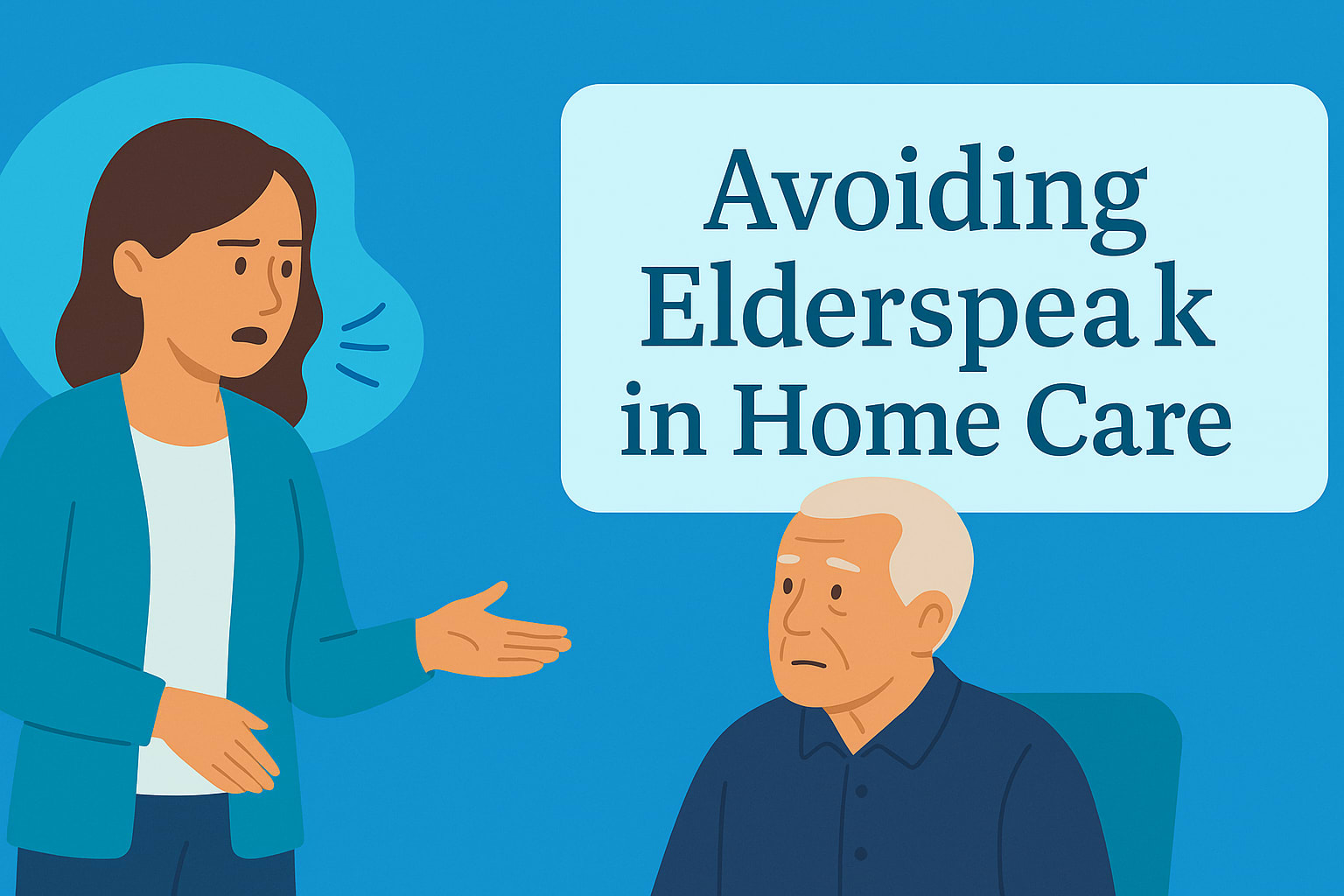Effective Communication in Home Care: Rethinking Elderspeak

Effective Communication in Home Care: Rethinking Elderspeak
Avoiding "Baby Talk" Can Improve Caregiver-Patient Relationships and Enhance Patient Dignity
Effective communication is the foundation of trust and respect in home care. But what happens when that communication unintentionally undermines the relationship? In many caregiving situations, caregivers unknowingly use a style of communication called “elderspeak,” sometimes referred to as “baby talk.” While this approach might seem gentle or caring, it can actually have a negative impact on older adults.
What is Elderspeak?
Elderspeak involves speaking to older adults using exaggerated tones, simplified vocabulary, or terms like “sweetie” or “dear.” Though often meant with kindness, this communication style can unintentionally make seniors feel like they’re being treated as less competent or independent.
One caregiver shared, “I just want to make sure they feel comfortable, so I use a soft tone and call them ‘sweetheart.’ But I never realized that it might be coming across as patronizing.” It’s a common mistake many caregivers make, thinking they’re being compassionate when, in fact, their words may make the individual feel belittled.
Why Elderspeak Can Backfire
Despite its good intentions, elderspeak can negatively affect the caregiver-patient relationship in a few key ways:
-
Perception of Patronization: Many older adults perceive elderspeak as condescending. It can make them feel like they’re not capable of making decisions or managing their own care.
-
Resistance to Care: The use of elderspeak has been shown to increase resistance to care, especially in individuals with dementia. When patients feel undermined, they’re less likely to cooperate.
-
Cognitive and Emotional Impact: Research shows that elderspeak can harm comprehension and lead to feelings of isolation and depression, affecting the mental health of seniors.
The Impact of Elderspeak
Imagine being called “sweetie” or “honey” every time you ask a question or need assistance. While it’s meant to be endearing, it can have the opposite effect. Elderspeak can undermine a senior’s confidence and sense of autonomy, making them feel more like a child than an adult.
Research in the International Journal of Nursing Studies (2022) showed that elderspeak reinforces harmful stereotypes about aging, suggesting that seniors are incapable of making decisions for themselves. This only limits their potential and dignity.
Moving Beyond Elderspeak
So how can we communicate better with older adults while maintaining their dignity and independence?
It’s important to treat seniors with the same respect you would offer to any other adult. Here are a few tips to move away from elderspeak and build more respectful relationships:
-
Use Clear, Simple Language: Keep your vocabulary straightforward. Instead of “Let me help you, sweetheart,” try saying, “I’m going to help you with your bath when you’re ready.” This respects their autonomy and provides clarity without implying weakness.
-
Maintain a Normal Tone and Pace: Speak at a regular volume and pace. Avoid the exaggerated intonation that is characteristic of elderspeak.
-
Address Clients by Their Name: Use formal titles unless the person prefers otherwise. “Mr. Johnson” or “Ms. Thompson” is far more respectful than “sweetie” or “dear.”
-
Make Eye Contact: It shows attentiveness and helps build a connection with the person you’re caring for.
-
Be Patient and Attentive: Allow time for responses and be mindful of non-verbal cues, like body language or facial expressions.
A Call to Action
As caregivers, we must be mindful of the language we use. It’s not just about eliminating terms like “honey” or “sweetheart”; it’s about changing how we view and engage with older adults. By focusing on a more person-centered approach, we can empower seniors, show respect for their dignity, and improve patient outcomes.
Habits can be hard to break, but the rewards of respectful communication—stronger relationships, better cooperation, and enhanced dignity—are well worth the effort.
Further Reading:
- For an in-depth analysis of the dangers of elderspeak, you can read the study by Shaw et al. (2022) in the International Journal of Nursing Studies[Source]
- The article "Honey, Sweetie, Dearie: The Perils of Elderspeak" offers further insights into training programs aimed at reducing elderspeak [Source]
